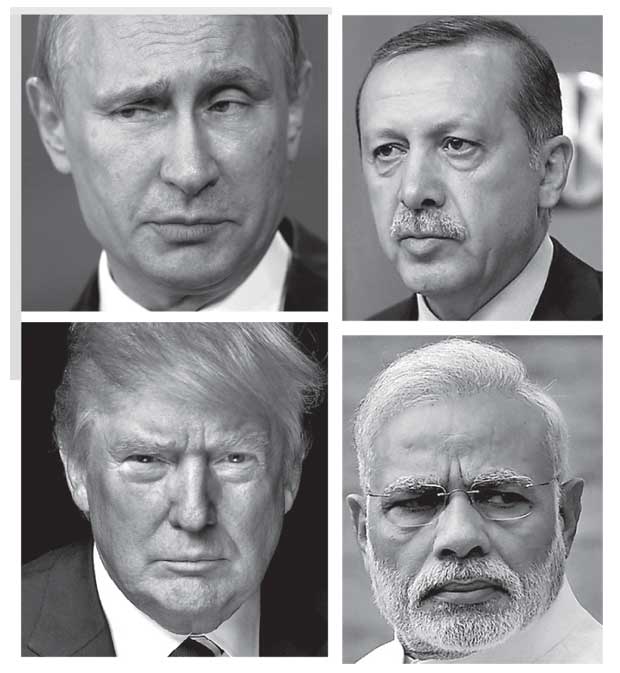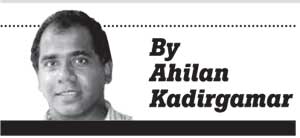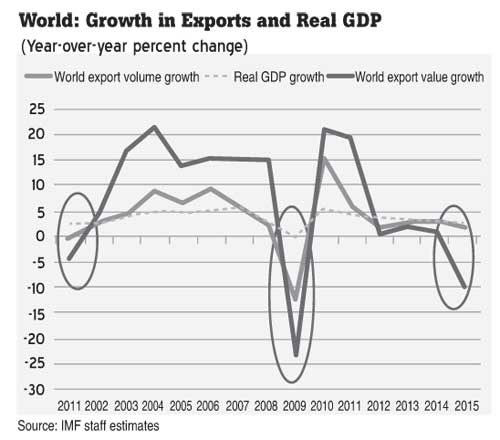Reply To:
Name - Reply Comment

The Global Economic Crisis of 2008 continues to ravage the world. The economic fallout is evident from the decline in global economic growth and tremendous decrease in international trade. The political consequences of the crisis in turn are shaping the emergence and consolidation of authoritarian populist regimes.
Neo-liberal globalisation starting in the 1980s was centred on the push for free trade, free flow of capital, deregulation and privatisation. While global trade growth was double and even triple global economic growth in the 1990s considered the period of hyper globalisation, after the 2008 crisis, global trade growth is well below global economic growth.
And if one is to look at the value, as opposed to volume, of global exports there is a tremendous absolute decline in recent years. 
Source: Gee Hee Hong, Jaewoo Lee, Wei Liao and Dulani Seneviratne. China and Asia in Global Trade Slowdown. IMF Working Paper, May 2016.
Despite such falling levels of global trade, powerful right wing regimes and political forces around the world today are vocal against international trade and are making a strident call for protectionism. They blame their economic woes on minorities including immigrants for the loss of jobs and international imports for declining production in their countries.
Does the 2008 crisis signify the end of neo-liberalism and the emergence of a new era of authoritarian populism? Or is it a shift in the workings of neo-liberal global capitalism embracing the politics of authoritarian populism?
The regimes of Trump in the US, Putin in Russia, Modi in India and Erdogan in Turkey are characteristic of authoritarian populism. Their disregard for liberal democratic norms betray their authoritarianism. Their xenophobic and racist rhetoric claiming to save their racial populations are symptomatic of populism. Such authoritarian populism is also on the rise with the major electoral gains of far right parties in Europe and other parts of the world.
The concept of authoritarian populism, however, has been around for decades. Stuart Hall, the prominent Marxist cultural critic, deployed the concept of authoritarian populism to analyse the shift in British politics with the rise of Margaret Thatcher in the late 1970s. Hall’s critical writings were a response to the major political economic changes with the global economic downturn at that time and the challenges that emerged for leftist politics with the decisive political turn to the right.
Hall recognised the contradictions between the ideological claims of Thatcherism and its programmes that purportedly sought to solve the structural economic crisis. Hall pointed out that Thatcherism would not solve the economic crisis nor achieve economic stability. However, Hall also recognised the  dangerous ideological drift to the right, and that economic factors alone were not going to determine the fortunes of the right wing regime.
dangerous ideological drift to the right, and that economic factors alone were not going to determine the fortunes of the right wing regime.
He called on the left to build durable historic alliances among white workers, black workers and feminists, who were all devastated by the dismantling of the social welfare state, attacks on trade unions and racist “law and order” policies.
Interestingly, Hall deployed the concept of authoritarian populism, at the very moment in the late 1970s, which we now consider the beginning of the neo-liberal era.
Indeed, the early movers of the neo-liberal project in the late 1970s into the early 1980s, such as Thatcher in the UK, Reagan in the US, Pinochet in Chile, and for that matter Jayewardene in Sri Lanka, were authoritarian in their approach to reshaping the economy. In taking forward capitalist class interests of expanding markets and increasing profits after the major economic downturn in the 1970s, these regimes used repressive state power to crush trade unions and peoples movements opposed to neo-liberal policies dismantling social welfare.
In Sri Lanka as in much of the world now, we are trapped between accelerating neo-liberal policies and authoritarian populism. While the far right UNP agenda is pushing for neo-liberal policies at any cost, the Rajapaksa regime is attempting to return through populist mobilisations with the support of a section of the SLFP and chauvinist forces.
The Sirisena-Wickremesinghe Government is expanding on the Rajapaksa regime’s neo-liberal projects such as the privatisation of education and healthcare evident from their defence of SAITM, the massive infrastructure projects such as Hambantota port and the Port City, and financialisation with the international financial centre for which support was negotiated with the Asian Development Bank years ago.
While the Rajapaksa regime intimidated and attacked trade unions and peoples’ movements with its show of authoritarian and even militarised power, the current Government’s ideological and physical attacks draw on its unconditional commitment towards market expansion.
In this context, the remnants of the Rajapaksa regime in turn hope to ride the wave populism in other parts of the world. They are trying to channel the rising economic discontent into an authoritarian populist project with a reinvented Rajapaksa regime as the national saviours of a declining Sri Lanka.
Neither neo-liberalism nor authoritarian populism can provide solutions to capitalist crises. Rather, they use different means and mechanisms to reinforce an economy that only sharpens class inequalities in society, where the rich get richer and others get poorer. Neo-liberalism seeks to change social relations towards individualisation and deploys the ideology of individual responsibility, and uses state power to repress any form of collective resistance by the marginalised in society. Authoritarian populism in turn deflects attention from class oppression by finding scape goats among minorities and through xenophobic hate politics that even provoke violence.
For the neo-liberal ideology of free trade, globalisation and individual responsibility, the authoritarian populist ideology substitutes protectionism, economic nationalism and blames minorities and immigrants. But neither challenges global finance capital central to accumulation by contemporary capitalism and also the cause of repeated and deepening economic crises.
Addressing capitalist crises requires structural change to the economic system. But even the US with all its imperial power could not shift its policies despite the tremendous shock of the 2008 crisis. The economic instability at the core of the capitalist system contributes to political instability. The neo-liberal handling of the 2008 crisis paved the way for Trump with his racist and xenophobic populist project.
In this context, Trump as expected, has done nothing to address the financial crisis including the possibilities of such future crises in the US economy. While Trump has stuck to his promise and refused to take forward the Trans-Pacific and Trans-Atlantic trade pacts, he refrains from questioning financialisation and the international flows of finance capital. In fact, instead of challenging Wall Street responsible for the crisis of 2008 and deepening inequalities in the US, his administration is packed with financiers.
As with Trump’s support for white supremacists, his economic nationalism, is also geared towards mobilising a right wing social base to ensure his populist power. Trump’s brinkmanship will not address the economic problems in the US, and is even undermining US imperial power, but in the process Trump is tearing apart American society and likely to create tremendous international turmoil including further violence and even wars.
In this context, the challenge before progressive forces, such as trade unions, co-operatives and social movements, is to simultaneously oppose both neo-liberalism and authoritarian populism. But opposition alone will not do, and an alternative programme to build broad progressive alliances and the basis for ideological struggle are urgently needed.
One important platform for such an alternative is the demand for equality. That is an ideological struggle for equality that challenges class, gender, ethnic, religious, caste and other inequalities.
Taking equality seriously means not just liberal lip service about equality before the law. Rather, powerful mobilisations against the neo-liberal economic processes of individualisation and  dispossession as well as countering populist attacks against minorities and “outsiders”.
dispossession as well as countering populist attacks against minorities and “outsiders”.
Equality means little without economic democracy, where people are assured of free healthcare, free education, food and shelter including through food subsidies and public housing.
It also means decent work for a decent life. Equality requires active redistribution to reduce income and wealth inequality, including progressive taxation with wealth taxes, property taxes and welfare entitlements.
Neo-liberalism with its push for individualised responsibility, where the state plays no role except to create business friendly conditions in the interests of capital, is best captured by Thatcher’s famous quote, “There is no such thing as society.” With authoritarian populism, capital’s agenda continues but with the idea of there is only one society; a homogeneous, mono-ethnic or racist society. Society in its plural form and with responsibility towards the social and economic lives of all people must be defended and strengthened, and that would benefit from a radical conception of equality.